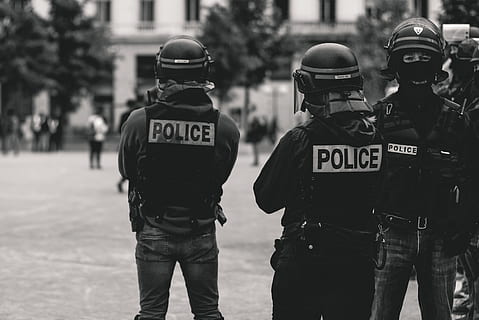
Ignited by the murder of George Floyd on May 25th, 2020, protests are continuing all over the world in support of the countless Black lives lost to police brutality in the U.S.
With the exception of looting and burning committed by those not in association with, or encouraged by, organized protestors, these demonstrations have remained peaceful.
But what happens when those meant to keep us safe face protesting citizens with brutality and force, rather than support?
What happens when the union —one of the most powerful organizations in the country—would rather change the people’s perspective of them, than change their actual behavior?
In an attempt to spotlight and even glorify the police, many media outlets are turning to copaganda.
Don’t be fooled.
But What Exactly is Copaganda?
The term copaganda is a combination of the words cop, and propaganda—which Merriam Webster defines as, “the spreading of ideas, information, or rumor for the purpose of helping or injuring an institution, a cause, or a person.”
The play on words, “copaganda,” refers to every overarching, positive, heart-felt depiction of police officers as heroic. It’s the social media post made by a local police department showing an officer marching alongside revolutionaries. It’s that YouTube video of cops kneeling with protestors.
Copaganda Amid Protests
In the current case of protests, copaganda is intended to draw attention away from the oppressed, and towards the oppressor.
For every post holding the police accountable for the unnecessary and unlawful force being used on protestors “protected under the first amendment,” there seems to be another depicting the opposite.
In Philadelphia, for example, news outlets continue to share images of officers taking a knee with protestors, while simultaneously showing clips of an officer pulling down a kneeling demonstrator’s goggles to spray her in the face with mace.
Twitter accounts like that of the Metro Nashville PD, chose to glorify themselves with pictures of an officer fixing a local basketball hoop just one month after tear-gassing protestors outside the Metro Courthouse.
What About cop Shows?
The country seems, in some ways, ready for police reform. But why did it take so long for us to come to this conclusion?
While the social media posts are most prominent during the current political climate, major culprits of copaganda and the framing of the nation’s attitude towards police are TV shows like Chicago PD and Cops, and Law and Order.
Many of these shows consult real police officers who are very aware that their portrayals impact public perception. Thus, we can assume that these consultants have somewhat of a biased interest in making that portrayal a positive one.
According to a study by Kathleen M. Donovan and Charles F. Klahm, “viewers of crime dramas are more likely to believe the police are successful at lowering crime, use force only when necessary, and that misconduct does not typically lead to false confessions.”
Further, comedian and political commentator, Trevor Noah, recently noted the effects of these shows on an episode of The Daily Show, titled, “Copaganda – How Cop Shows Lie to You.”
Noah detailed the way in which these shows make it seems like cops only break the rules if they “have to” in order to catch the criminal. When they have to beat somebody up once and a while, that’s okay, as long as it gets them the truth!
As perfectly put by Noah, however, “Beating a suspect is a great way to get them to confess to something they didn’t do.”
But why is it bad?
Of course, we want to believe that cops are good. We want to believe they are not only protecting us, but standing beside us in the fight for change.
Some are.
However, social media and television are extremely powerful tools often used to shape the opinion of an entire nation, and these performative displays cause harm in presenting the oppressor as the ally.
When videos of police blocking-in and tear gassing protestors on the highway are overshadowed by an image of an officer with a knee to the ground, we are facing a much larger issue.
Written by Rita Thompson
We Will Persist: What the Media Is Leaving out of Protest Coverage



Leave a Reply